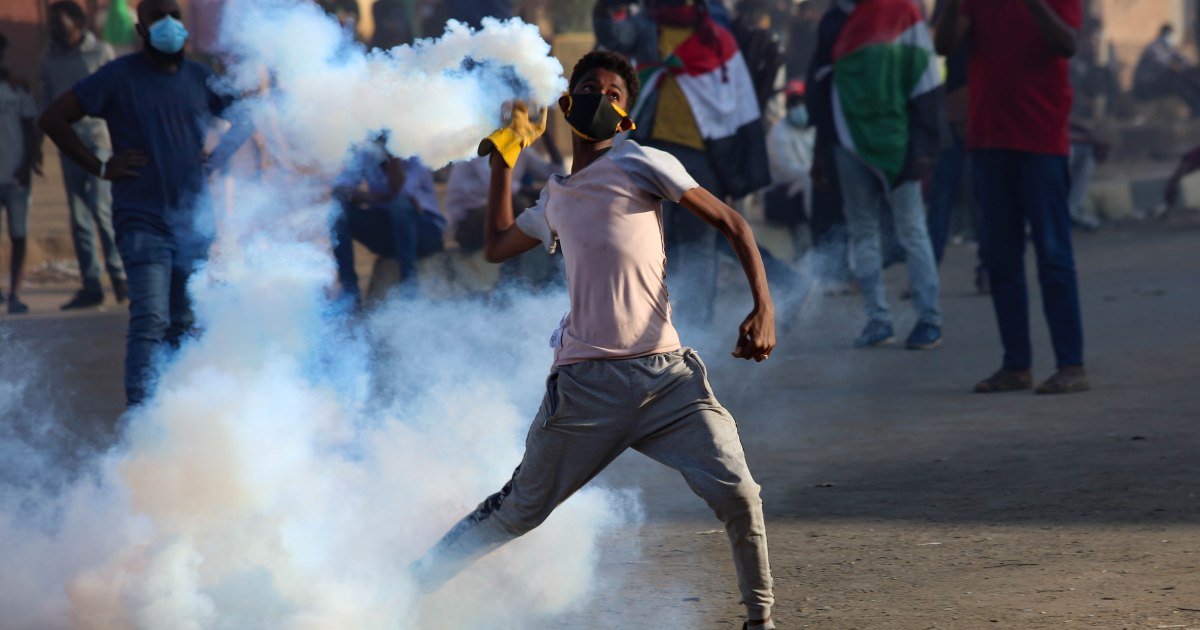Sudanese security forces fired tear gas to disperse thousands of demonstrators participating in the "million martyrs" in Khartoum to demand civilian rule and condemn the bloody violence witnessed last week's protests, amid anticipation of political consultations and Washington's call to form a credible government.
The protesters were marching towards the presidential palace in the center of the capital, carrying Sudanese flags and banners reading "the military to the barracks" and chanting "apostasy is impossible" and "power is the authority of the people" when security forces fired liquefied gas.
On Sunday morning, the Sudanese authorities closed the bridges linking Khartoum and the neighborhoods of Omdurman and Bahri, and security forces were deployed on vehicles equipped with weapons and cut off communications, including the Internet, in preparation for the announced demonstrations.
The Sudanese Professionals Association - the professional entity that played a pivotal role in the uprising that toppled Omar al-Bashir in April 2019 - called in a statement on Saturday to make 2022 a "year of continuous resistance."
He said that he calls on "the masses of the Sudanese people and the masses of Sudanese professionals and wage workers in all cities and villages of Sudan" to "go out and actively participate in the millions processions on January 2, 2022, so let us make it a year of continuous resistance."
Coinciding with the calls, telecommunications and mobile internet services were cut off in the capital today.
The demonstrators are demanding that the army not have a role in the government during a transitional period that ends with free elections.
Today's protests come after 6 protesters were killed and hundreds injured in anti-army demonstrations across the country last Thursday.
The Central Committee of Sudan Doctors said that the total deaths since the start of the security forces' crackdown in October has now reached 54.
The army commander, Abdel Fattah Al-Burhan, had dismissed and arrested Prime Minister Abdullah Hamdok and members of his government on October 25, but he returned him to his position without his government following international and local pressures on November 21.
The two men later signed an agreement to restore the democratic transition to its tracks and reassure the international community, which reduced its aid after the "coup." The agreement was not satisfactory to all parties in Sudan, so protests continued in the streets.
political consultations
The circles in Sudan are awaiting the outcome of the consultations taking place between the political forces and Prime Minister Abdullah Hamdok, who requested a meeting with the leaders of the Revolutionary Front and the National Charter Group, as well as the Central Council for Freedom and Change.
These calls come in parallel with news of the prime minister's intention to resign from his post in the event that the political forces do not reach a consensus to get out of the current crisis.
For his part, a member of the Sovereignty Council, Abdel-Baqi Abdel-Qader Al-Zubair, told Al-Jazeera that he handed his resignation on Saturday evening to the head of the council, who has not decided on the matter yet.
A source from the Zubair family confirmed that he had refrained from attending the Sovereign Council meeting yesterday;
He pointed out that the reasons for his resignation were due to the use of violence against the demonstrators.
In the context of solutions proposals, the Sudanese Professionals Association submitted a proposal called the "Political Charter to Complete the December Revolution".
The proposal, which Al Jazeera obtained a copy of, stipulates the necessity of overthrowing the Military Council and forming a civilian transitional authority for a period of 4 years.
It also provides for the formation of an honorary civilian Sovereignty Council, a Council of Ministers whose members do not exceed 20 people from revolutionary competencies, and a civilian legislative council.
The proposal of the gathering of professionals also called for the construction and restructuring of the regular forces and the dismantling of all militias, especially the Rapid Support Forces, and for the Prime Minister to be the commander-in-chief of the armed forces.
American invitation
At the international level, US Secretary of State Anthony Blinken considered that the army's seizure of power in Sudan and the violence against demonstrators cast doubt on the chances of a democratic Sudan emerging.
Blinken expressed his country's readiness to respond to those he called who seek to obstruct the Sudanese people's aspiration for a democratic government with civilian leadership.
The US Secretary called on the Sudanese security forces to stop using lethal force against the demonstrators.
He also urged Sudan's leaders to expedite the formation of a credible government, transfer the leadership of the Sovereignty Council to the civilian component, establish a legislative council, and form judicial and electoral bodies.
In turn, Salma Abdel-Jabbar, a member of the Sovereign Council in Sudan, said that the council stressed, in its meeting yesterday, to address the current crisis through dialogue.
This came after two emergency meetings held by the President of the Council, Abdel Fattah Al-Burhan, with the Sovereignty, Security and Defense Councils.

